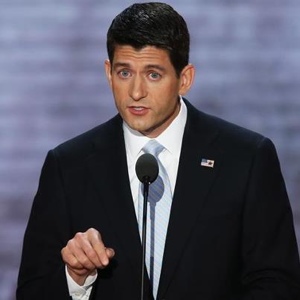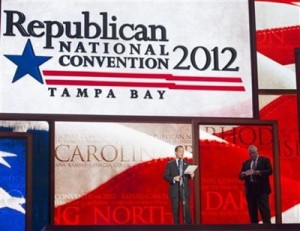Paul Ryan gets it. Last night’s convention speech was a tour de force, clearly and forcefully arguing not only why the Obama Administration has failed, but what the Republican Party stands for in opposition to the last four years. There were many notable lines—but the most powerful part of the speech was this:
President Obama is the kind of politician who puts promises on the record, and then calls that the record. But we are four years into this presidency. The issue is not the economy as Barack Obama inherited it, not the economy as he envisions it, but this economy as we are living it.
College graduates should not have to live out their 20s in their childhood bedrooms, staring up at fading Obama posters and wondering when they can move out and get going with life. Everyone who feels stuck in the Obama economy is right to focus on the here and now. And I hope you understand this too, if you’re feeling left out or passed by: You have not failed, your leaders have failed you.
That is one of the most damning indictments of the Obama Administration possible. Because it cuts to the quick of why Obama has failed. He came into office promising to be a different kind of politician—someone who would transcend the petty divisions of everyday politics and get America back on track. As our future Vice President eloquently stated, his lack of leadership has failed us.
Lying Liars and the Lying Lies They Lie About
And the real sign of how successful Ryan’s speech has been the cacophony of idiocy that has been unleashed by the left. The official meme is that Paul Ryan’s speech was filled with “lies”—the definition of “lie” being “things that Democrats disagree with or make Democrats look bad.
Take the most commonly-cited example of one of Ryan’s so-called “lies:”
President Barack Obama came to office during an economic crisis, as he has reminded us a time or two. Those were very tough days, and any fair measure of his record has to take that into account. My home state voted for President Obama. When he talked about change, many people liked the sound of it, especially in Janesville, where we were about to lose a major factory.
A lot of guys I went to high school with worked at that GM plant. Right there at that plant, candidate Obama said: “I believe that if our government is there to support you … this plant will be here for another hundred years.” That’s what he said in 2008.
Well, as it turned out, that plant didn’t last another year. It is locked up and empty to this day. And that’s how it is in so many towns today, where the recovery that was promised is nowhere in sight.
Immediately after the speech, Chris Matthews entered into a foaming-at-the-mouth rage proclaiming that this section of the speech was a “lie.” The left went into their usual paroxysms of rage over the supposed “lie,” claiming that the Janesville plant was shut down in mid-2008 rather than the Obama years.
But, as typical, the self-appointed “fact checkers” got it utterly wrong—the Janesville plant closed its doors for good in May 2009, even though as Ryan said, the plant had been slated to close since 2008.
This is another example of the tactics of the left—they seize upon irrelevant minutiae and try to explode it into an issue, amplifying their silliness through the left-wing echo chamber of liberal blogs, MSNBC, and the Obama Administration itself. The problem for them is that those tactics are becoming less and less effective as more and more Americans are becoming wise to them.
Why Ryan Rose Above
But enough about the left. What matters is whether Ryan connected with the average voter and demonstrated that he could take the job of Vice President. On that account, he hit a home run. Ryan was initially a little nervous—understandable for such a momentous speech in his political career. But as he went on, he hit his stride and spoke with both fluency and authority. Ryan needed to do well last night, and he did. He connected with the audience, both on the convention floor and on television.
One of the jobs of a VP nominee in a campaign is to be the attack dog, and Ryan delivered a blistering speech about Obama. But the way he did it was crucial to his success. This wasn’t a speech about blasting Obama with both barrels, this was a speech that struck a tone of disappointment. Americans don’t like Obama’s record, but they still look at him far more kindly than he deserves. What Ryan did was acknowledge that, but speak directly to the sense of palpable disappointment that many voters feel. As he put it:
It all started off with stirring speeches, Greek columns, the thrill of something new. Now all that’s left is a presidency adrift, surviving on slogans that already seem tired, grasping at a moment that has already passed, like a ship trying to sail on yesterday’s wind.
President Obama was asked not long ago to reflect on any mistakes he might have made. He said, well, “I haven’t communicated enough.” He said his job is to “tell a story to the American people” – as if that’s the whole problem here? He needs to talk more, and we need to be better listeners?
Ladies and gentlemen, these past four years we have suffered no shortage of words in the White House. What’s missing is leadership in the White House. And the story that Barack Obama does tell, forever shifting blame to the last administration, is getting old. The man assumed office almost four years ago – isn’t it about time he assumed responsibility?
Again, damning stuff, but not a full-barreled attack. Ryan didn’t need to call the President names. He didn’t need to insult his honor, he didn’t need to accuse him of wanting to harm seniors or call him a “sociopath” or go down the low road so well-trodden by the left. Ryan simply told it like it is. He hit Obama right where it hurts, and right where Obama is weakest. This is the message that the GOP needs to take to all those voters not already in Obama’s camp. This is the message that says “we get why you chose Obama in 2008, but things are different now.”
Now, Romney needs to close the deal. And I have a feeling that if he matches the rhetorical prowess that Paul Ryan displayed last night, he’ll be doing very well this fall.
A Word on Condi
But one quick post-script. I’ve been a fan of Dr. Condoleezza Rice for some time. I think she was a highly-effective Secretary of State in a tough time. But last night Dr. Rice demonstrated that she is one of the brightest stars in the GOP firmament. Her speech was powerful, direct, eloquent, and emotional at times. She displayed a passion for education reform, a deep understanding of foreign policy, and a real sense of what it is to be a conservative.
I suspect she’s far too smart to ever really consider running for President. But that’s a great loss to this country, because she would be a wonderful President.
Oh, and that supposed “war on women” that the GOP has been fighting. Judging from Dr. Rice, Ann Romney, Nikki Haley, Susannah Martinez, and the rest, that talking point is not only stale and odious. And who will the Democrats feature? Sandra Fluke, a woman whose claim to fame is a demand that government give her free birth control. Compare her to Dr. Rice, a woman who went from the Jim Crow-era South to being a concert pianist, an expert on Russian affairs, Secretary of State, and now teaches at Stanford—the contrast in what party values women as individuals of accomplishment and which party just panders to women could not be more clear.



